What makes nuts such a superfood ... here are 10 reasons why
Want to reduce your risk of cardiovascular disease by 15 per cent? All you may have to do is eat a handful of nuts a day.
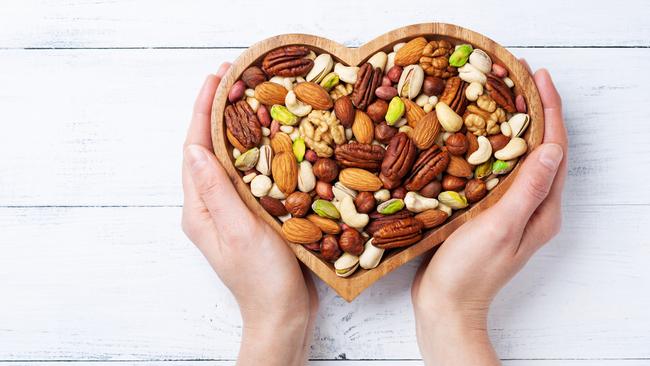
Want to reduce your risk of cardiovascular disease by 15 per cent? All you may have to do is eat a handful of nuts a day.
A review of 182 studies from 25 countries by the University of Wollongong has found that eating nuts reduces your levels of “bad” LDL cholesterol significantly, reduces triglycerides, and improves endothelial function – all significant factors in heart disease.
In addition, nuts have multiple bioactive components and nutrients such as polyphenols (rich in antioxidants which reduce cancer risk and have a neuroprotective effect), vitamin E, riboflavin, selenium, manganese, copper and zinc.
Associate Professor Yasmine Probst from the University of Wollongong recently reviewed the body of nutrition research on the effect of nuts on reducing CVD risk and says nuts have a unique nutritional profile.
“They really do have a different composition in terms of the nutrients inside them by comparison to some other food types. They contain large amounts of unsaturated fats in particular, they’re high in protein, they’ve got dietary fibre in them, and they also have a range of other vitamins and minerals and some emerging nutrients, which are considered to be also cardioprotective as well, such as flavonoids, phenolic acids, phytosterols and resveratrol.”
But only 2 per cent of Australians eat the recommended serving of nuts a day, perhaps because many people believe that eating nuts will result in weight gain - a fear which has been disproven by science.
“Because you don’t absorb up to 30 per cent of the fat in nuts, they are not linked to weight gain,” says dietitian Belinda Neville from the organisation Nuts for Life. “That’s quite a significant barrier as to why people don’t like to eat nuts, but we know from research that nuts are absolutely not associated with weight gain, in fact those that eat nuts tend to be a healthier weight and have a healthier BMI index than those that don’t eat nuts regularly.”
So what makes nuts such a superfood? Here are ten reasons why.
Nuts are full of ‘good’ fats
Nuts have a unique fatty acid profile – with a high proportion of monounsaturated and/or polyunsaturated fatty acids relative to saturated fatty acids – which may, in part, explain their favourable effects on blood lipid profiles. Monounsaturated fats have one double bond in their carbon chain, where polyunsaturated fats are even better, containing two or more double bonds. These fats reduce inflammation in the body and are more likely to be burned for energy and less likely to be stored in fat tissue. They also actively lower the levels of LDL and positively tip the balance between LDL cholesterol and ‘bad’ HDL cholesterol, thereby reducing the risk of heart disease.
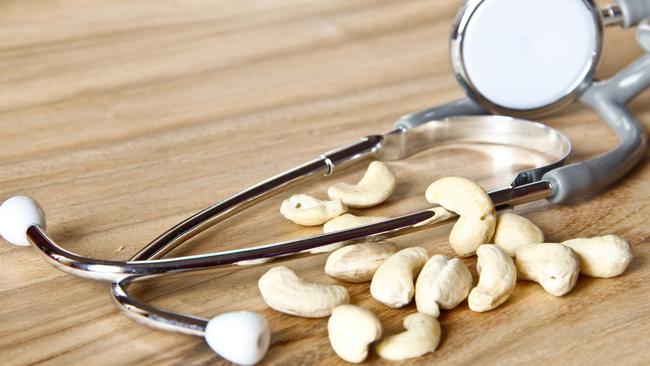
Nuts are a potent source of phytosterols
Phytosterols are found in plant cell membranes and block cholesterol from being absorbed by the body and increase faecal cholesterol excretion. In your gut, phytosterols compete with dietary cholesterol for certain enzymes needed for their metabolism. This can reduce cholesterol absorption by 30–50 per cent. Pistachios, macadamia nuts, almonds, cashews, peanuts and hazelnuts are richest in phytosterols.
Nuts are the richest plant source of L-arginine
L-arginine is an amino acid that is involved in the synthesis of nitric oxide, which dilates the blood vessels and arteries, improves circulation and improves endothelial function, helping regulate blood pressure. It improves blood flow in the arteries of the heart, which prevents arteries from becoming clogged. L-arginine also stimulates the release of insulin, thus playing a role in the regulation of blood sugar. It also plays a role in wound healing, helping the kidneys reduce waste, and maintaining immune and hormone function.
Nuts can lower triglycerides
Some nuts contain n-3 polyunsaturated fatty acids, which can lower blood triglycerides. When you eat, your body converts any calories it doesn’t need into triglycerides, and later the body releases triglycerides for energy between meals. If you regularly eat more calories than you burn, it can lead to high triglycerides. High triglycerides may contribute to hardening or thickening of the artery walls which increases the risk of stroke, heart attack and heart disease. Because nuts contain healthy unsaturated fats, they cause the liver to preferentially convert the fatty acids they contain into ketone bodies instead of triglycerides.
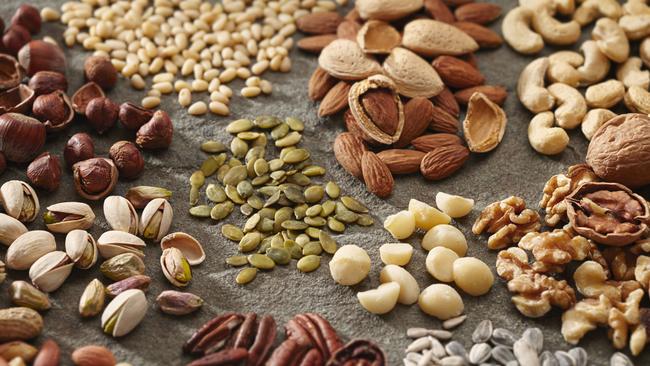
Nuts are a rich source of phytochemicals
Nuts contain a range of antioxidant phytochemicals such as polyphenols, vitamin E, riboflavin, selenium, manganese, copper and zinc which are thought to positively affect fat oxidation, oxidative stress (which can damage cells) and platelet function (which plays a role in immunity). This rich range of phytochemicals is also believed to have a positive effect on cholesterol.
Nuts contain good levels of soluble dietary fibre
Soluble fibre lowers cholesterol reabsorption by binding to cholesterol in the small intestine. Nuts contain between 5-15g dietary fibre per 100 grams. Almonds are highest in soluble fibre, followed by pine nuts, pistachios, hazelnuts, pecans, macadamia nuts, peanuts and brazil nuts. Soluble fibre also helps keep your bowel regular.
Some nuts are beneficial for your brain and may protect against depression
Evidence has found that consuming the trace mineral selenium, found in high quantities in brazil nuts, can improve mood and brain function, which may help prevent depression. Selenium also increases antioxidant effects in the body, reducing cancer risk and lowering the risk of high blood pressure and even cataracts.
Nuts guard against free radicals
Because nuts are a rich source of antioxidants, they can combat oxidative stress by neutralising free radicals, which are unstable molecules that may cause cell damage and increase disease risk including cancer. Walnuts and pecans are particularly high in antioxidants.
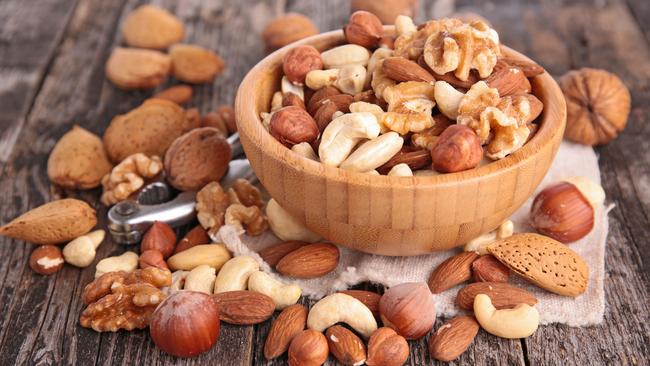
Nuts may aid in weight loss
Although nuts are high in calories, 30% of the calories in nuts are not absorbed by the body, because a portion of the fat in nuts stays trapped in their fibrous wall during digestion. Studies have indicated that eating nuts is not associated with weight gain and those that eat 30 grams of nuts a day had a lower BMI. Because of their dietary fibre content, nuts can make your feel full, leading to a lower overall consumption of daily calories.
Nuts reduce inflammation in the body
Inflammation in the body can cause damage to organs and is linked to a variety of diseases including heart disease and autoimmune diseases. Nuts including pistachios, brazil nuts, walnuts, and almonds have been found to fight inflammation in healthy people and those with serious conditions like diabetes and kidney disease.




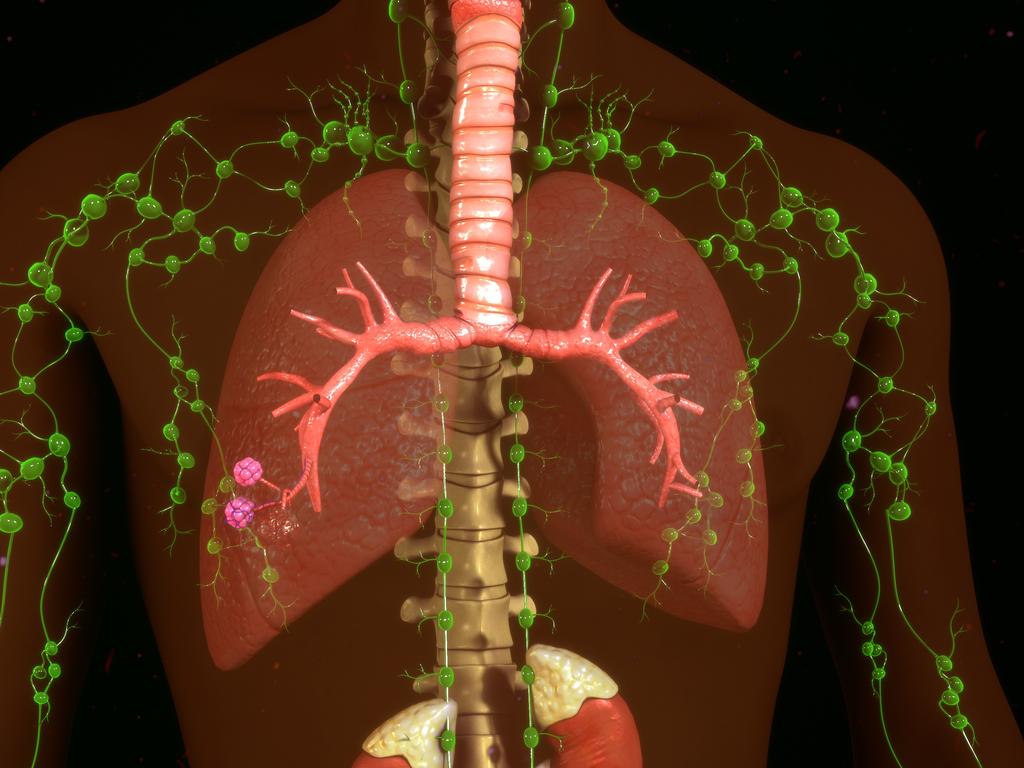

To join the conversation, please log in. Don't have an account? Register
Join the conversation, you are commenting as Logout